By Eric Acre,
staff writer
Michael Eric Dyson, an author, radio host, and professor of sociology at Georgetown University, spoke at Thursday’s Common Hour as part of F&M’s second annual Civil Rights Week. He gave a presentation entitled, “Today’s Struggle for Civil Rights.”
Dyson has taught at colleges around the nation, including Brown University, Columbia University, DePaul University, and the University of Pennsylvania. He is also the author and editor of 18 books that tackle various issues of civil rights and analyze the lives of personalities, such as Tupac Shakur and Bill Cosby. Dyson was born in Detroit, became an ordained minister at age 19, received his bachelor’s degree from Carson Newman College in 1985 and his master’s and Ph.D in religion from Princeton University.
Dyson began his discussion by reminding the audience of some of the ideas of civil rights leader Martin Luther King’s.
“We can think about the fact that we celebrated the 50th anniversary of Martin Luther King Jr’s monumental speech and the march on Washington and the organization of a vast array of Americans to forge connections and to will their moral authority in the defense of ideals that had been withering on the vine of neglect — ideals like justice, ideals like freedom, ideals like equality; they had worked for some, but not for all,” Dyson said. “The ideals had been put in place for some members of society, but others were left to the margins.”
This poetic opening explained Dyson’s view that, although the U.S. has come a long way in the civil rights battle, the struggle will continue as long as there are people who cannot equally exercise their rights.
To illustrate his point about the decades-long deprivation of rights from certain groups, Dyson discussed how some African American soldiers who arrived home from World War II were lynched, castrated, murdered, or assaulted for wearing their uniforms in public. Dyson also recounted the struggles of Irish, Latinos, Asians, and other ethnic groups in America during the 20th century.
“America was great in many ways, and yet, in some areas, in some noticeable and very pronounced arenas of American pursuit, America did not live up to its creed,” Dyson said.
Later in the 20th century, the Civil Rights Bill, the Voting Rights Act, and the Fair Housing Act were all passed by Congress, which, according to Dyson, created the foundation for monumental social change in America. Each new law greatly improved civil rights inequality in the country.
“[In 2008] this nation made a monumental move towards fundamental transformation of American race relations and to expand the reach, the depth, and the breadth, of civil rights by electing Barack Obama,” Dyson said.
Despite enormous advances in the civil rights struggle, such as electing the first black president, there is still much work to be done to achieve equality for all people at all levels of society.
Dyson referred to the murder of Trayvon Martin as an example of the unlawful treatment of children, especially children who are minorities and dress in a way that has social stigma attached.
“The Stand Your Ground law [that was used as the defense for Martin’s murder] ultimately has racial consequence, and we must not, as a culture, demonize our own children,” Dyson said.
He also tackled the issue of the unequal rights of gay, lesbian, bisexual, and transgender individuals.
“Nobody owns the notion of freedom and justice struggles,” Dyson said. “You don’t have to be black to want to be free.”
Dyson meant this in response to minorities and other people who were once fighting for equal rights themselves but now fight to keep members of the LGBT community out of organized religion and from having equal protection under the law.
Lastly, Dyson discussed women’s rights and the continuing struggle women face to gain equality in the workplace and in the eyes of the American people. Dyson particularly focused on the wage gap between men and women and the persistence of rape culture.
“There are men trying to justify rape and discussing gradations of rape as if there is some understanding that we must have communicated among human beings to tell us when it’s really rape,” Dyson said. “And women continue to suffer in our nation, making less on every dollar than a man makes for doing the same job.”
Dyson’s speech was passionate and the audience seemed highly engaged throughout it, and his views on equality for all, not just select groups, was a fitting way to conclude F&M’s Civil Rights Week.
First-year Eric Acre is a staff writer. His email is eacre@fandm.edu.
